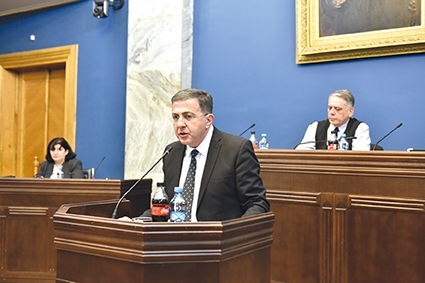Initial Figures from the New Accumulative Pension Scheme
Last week, Director of the Pension Agency of Georgia Levan Surguladze, released the first statistics on the country’s new pension system. In the first quarter of 2019, in the first three months of the program, 747,774 people enrolled in the new accumulative pension system, contributing approximately 175 million GEL ($64.8 mln) to the fund, including interest.
Of those enrolled in the scheme, about 25% work in the public sector, and the rest in the private sector.
Nearly 40% (294,852 people) of participants are over the age of 40, and thus eligible to opt-out of the scheme. Of those, 26% are public sector workers. So far, 2,915 people have opted out of the pension system the vast majority of whom were public sector employees.
“In two years, we expect to accumulate 1.5 billion GEL in the pension system, in six years – about 5 billion GEL, 80% of which should benefit the country’s economy,” Surguladze told the members of the Parliamentary Sector Economy and Economic Policy Committee. He also mentioned that the scheme will contribute to the development of the domestic capital market by creating the largest investment capital base in the country.
The new law on pension reform, establishing the accumulative pension system, was enacted on January 1 of this year. The long-awaited change is designed to give Georgians a retirement savings account that is more proportional to their earnings while they were working by taking a percentage of their pre-tax salary, ensuring financial support for retirees, and to further develop the Georgian capital market.
The new system has several phases. The first phase automatically enrolled all people working in Georgia under the age of 40, apart from self-employed people, into the new pension scheme. Workers 40 years and older and self-employed people could choose to voluntarily participate. While the automatic enrollment component was somewhat controversial, employees under the age of 40 will have the opportunity to opt out of the program starting in June of this year, which will return the pension contributions made on his or her behalf to the respective contributors.
Technically, it is a three-party investment scheme: employees contribute 2% of their pre-tax salary, the employer contributes an amount equal to 2% of the employee’s pre-tax salary, and the Georgian government contributes an amount equal to 2% of the employee’s pre-tax salary. If an employee’s salary is greater than 24,000 GEL ($8,888) per year, the government contributes only 1%, and if an employee’s salary is greater than 60,000 GEL ($22,222) per year, the government does not contribute at all. The self-employed can participate with a 4% personal contribution.
When Georgians reach the official state retirement age – 60 for men and 55 for women – they will gain access to their pension funds, distributed in monthly installments. The new pension scheme will not affect the current system, only supplement it, by which every retired Georgian is eligible to receive 200 GEL ($75) a month – a rate which increased by 20 GEL from January 1.
The funds contributed by the three parties are invested domestically in the hope that the funds will grow over time, keeping up at least with inflation. Currently, participants are only able to select a low-risk portfolio, but after five years, participants will have three options – low, medium, or high risk, correlating to the level of risk, and subsequent potential reward, of the investments for which a participant’s contributions will be used.
The move has been praised by many international observers, including Francois Painchaud, IMF Resident Representative in Georgia. Painchaud promoted investment and savings as an opportunity for Georgia’s development in an op-ed titled ‘Georgia’s Challenges & Opportunities,’ published in The Economist’s The World in 2019 Georgian edition. He wrote that, “The funded pension scheme will improve the living standards of future retirees and promote savings and businesses’ access to long-term Lari funding.”
In March, the Pension Agency announced an international competition to select the five members of the investment board who will be responsible for determining the investment policy of the Agency over the next five years, developing an investment policy document to be submitted to the Pension Agency Director for approval, modifying investment policy documents, quarterly monitoring and evaluation of all pension investment activities, assessing the compliance of investment activities with the investment policy document, and selecting specialized depositors and asset management companies.
The current pension fund is being kept in the National Bank of Georgia (NBG) and commercial banks until the investment board is staffed and investment activities begin.
By Samantha Guthrie
Image source: Parliament of Georgia












